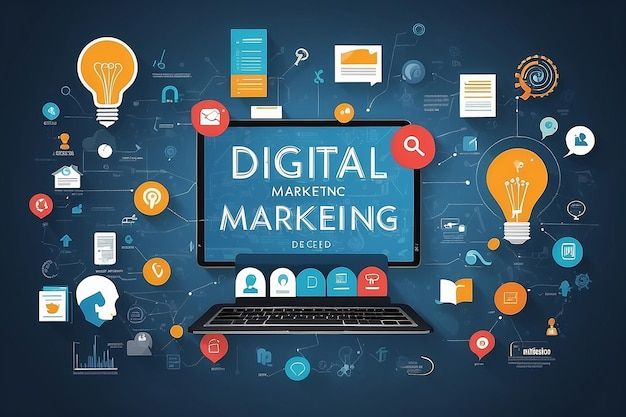
Digital Marketing Basics : A Comprehensive Guide For Beginners
In today’s digital age, businesses, big and small, are rapidly shifting their marketing efforts online. Whether you’re a student, a budding entrepreneur, or someone looking to grow a brand, understanding digital marketing is essential. This guide breaks down the core elements of digital marketing in simple terms to help beginners get started.
What is Digital Marketing?
Digital marketing refers to all marketing efforts that use the internet or electronic devices. Businesses use digital channels like websites, social media, search engines, email, and online ads to connect with current and potential customers.
Unlike traditional marketing (like newspapers or billboards), digital marketing is more targeted, measurable, and cost-effective.
Why is Digital Marketing Important?
📱 Wider Reach: Reach people globally, 24/7
📊 Measurable Results: Track performance in real-time
💰 Cost-Effective: Run ads with any budget
🎯 Targeted Approach: Reach the right audience based on interests, location, and behavior
📈 Build Online Presence: Grow your brand visibility and reputation
Core Components of Digital Marketing
Let’s explore the main branches of digital marketing that every beginner should know:
1. Search Engine Optimization (SEO)
SEO is the process of optimizing your website to rank higher in search engine results (like Google). The higher you appear, the more likely people will visit your site.
Basic SEO elements:
Keyword research
On-page SEO (titles, meta descriptions, content)
Off-page SEO (backlinks)
Technical SEO (site speed, mobile-friendly)
Example:
If you sell handmade soap, SEO helps your site appear when someone searches “best natural soap online.”
2. Content Marketing
Content is king in digital marketing. Content marketing involves creating valuable and relevant content to attract and engage a target audience.
Types of content:
Blog posts
Videos
Infographics
E-books
Podcasts
Purpose:
Build trust, improve SEO, educate customers, and drive leads.
3. Social Media Marketing
Social media platforms like Instagram, Facebook, LinkedIn, and YouTube are powerful tools to promote your brand and connect with your audience.
Benefits:
Increase brand awareness
Drive website traffic
Boost customer engagement
Run targeted ads
Tip: Start with platforms where your target audience is most active.
4. Email Marketing
Email marketing is one of the oldest but most effective forms of digital marketing. It allows you to send personalized messages, offers, and updates directly to your subscribers.
Best practices:
Use catchy subject lines
Keep it short and valuable
Add a clear call-to-action
Avoid spammy words
5. Pay-Per-Click (PPC) Advertising
PPC is a form of paid advertising where you pay each time someone clicks your ad. It’s commonly seen in Google Ads or Facebook Ads.
Advantages:
Instant traffic
Full budget control
Precise targeting
Popular platforms:
Google Ads, Facebook Ads, Instagram Ads, LinkedIn Ads
6. Affiliate Marketing
In affiliate marketing, you promote other people’s products and earn a commission for every sale made through your referral link.
How it works:
Join affiliate programs
Share product links in blogs or videos
Earn passive income when people buy through your link
7. Influencer Marketing
Brands collaborate with influencers (people with a large social following) to promote their products or services. It builds trust and reaches niche audiences.
Tip: Micro-influencers with smaller but loyal audiences can be more effective than celebrities.
Steps to Get Started in Digital Marketing
1. Understand the Basics: Learn the key terms and tools (SEO, content, analytics)
2. Choose Your Niche: Pick an industry or interest area to focus your skills
3. Build a Portfolio: Create sample blogs, social posts, or run mock campaigns
4. Get Certified: Take free or paid courses from platforms like Google, HubSpot, or Coursera
5. Practice Regularly: Start your own blog or handle a small brand’s social media
6. Stay Updated: Follow industry blogs, YouTube channels, and LinkedIn experts
Top Tools for Digital Marketers (Free & Paid)
Google Analytics – Track website traffic
Canva – Design visuals and posts
Mailchimp – Email marketing platform
Ubersuggest – Keyword and SEO tool
Meta Ads Manager – Run Facebook/Instagram ads
SEMRush / Ahrefs – Advanced SEO research tools
Digital Marketing Careers for Beginners
There are many career opportunities if you’re starting out in digital marketing:
SEO Executive
Social Media Manager
Content Creator
PPC Specialist
Email Marketer
Digital Marketing Analyst
Freelance Digital Marketer
With time and experience, you can even become a Digital Marketing Manager or start your own freelance agency.
Conclusion
Digital marketing is a fast-growing field with endless learning and career opportunities. Whether you’re a student, small business owner, or job seeker, mastering the basics can help you build your brand, land better jobs, or grow your business.
Start with one area, practice daily, and keep learning — because in digital marketing, growth never stops!
Need Help Getting Started?
If you’re looking a need help with your website and online strategy, As a digital marketing specialist in palakkad feel free to our website digitalbyswaliha.com for more resources or get in touch with our team for expert guidence.Let’s grow together!